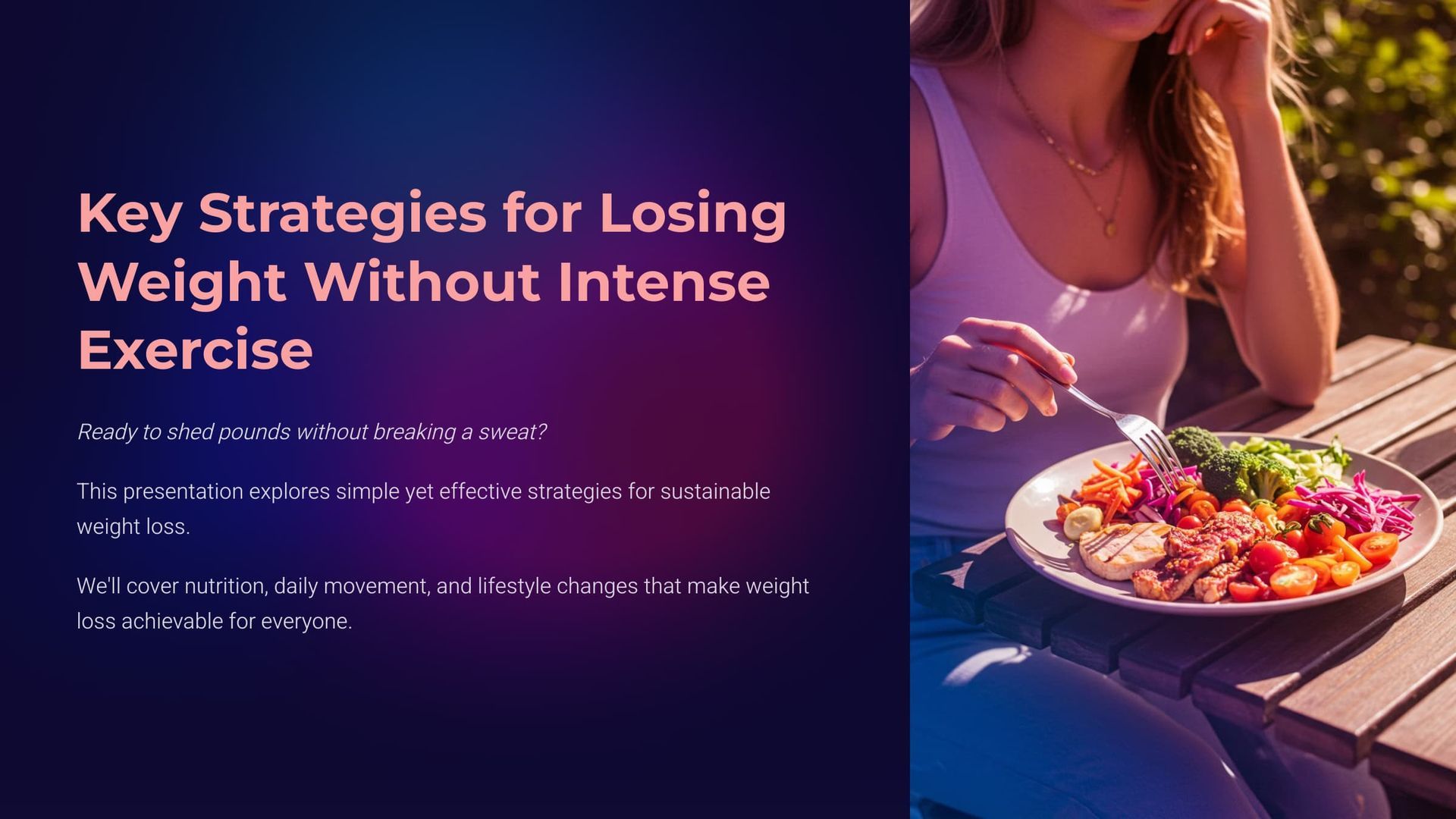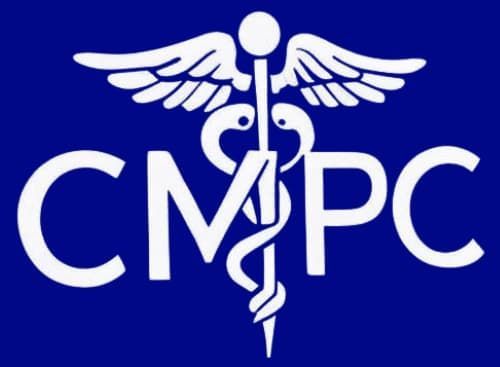
Understanding Weight Loss Without Intense Exercise
Weight loss fundamentally relies on the principle of caloric balance, which involves burning more calories than you consume. This principle is at the heart of any successful weight loss strategy. Although exercise is a well-known and effective method to increase calorie expenditure, it is essential to understand that it is not the only way to create a caloric deficit. Several factors contribute to the overall process of weight loss, which can be categorized as follows:
1. Diet and Nutrition
This is arguably the most significant weight loss factor. What you eat directly impacts your caloric intake. A balanced diet with appropriate portions is crucial for maintaining a caloric deficit. Foods rich in nutrients can enhance satiety, making it easier to eat less without feeling deprived. Additionally, paying attention to hidden calories in beverages and snacks can substantially affect progress.
2. Daily Physical Activity
While structured exercise is beneficial, small and consistent movements throughout your daily routine can also contribute significantly to calorie burning. Simple changes like opting for the stairs instead of the elevator, taking walks during breaks, gardening, or cleaning can add up over time and significantly increase calorie expenditure. Every little bit counts when it comes to improving your daily caloric burn.
3. Behavioural Changes
Developing sustainable habits is key to achieving long-term weight loss goals. It includes identifying triggers for unhealthy eating, setting realistic goals, and creating a supportive environment. Behaviour modification techniques such as mindful eating can help individuals recognize their hunger cues and emotional eating patterns, fostering better choices and consistency in their weight loss journey. Additionally, tracking food intake and physical activity can reinforce positive behaviors and motivate them to continue to succeed.
Weight loss is a multifaceted process that involves a combination of diet, physical activity, and behavioural strategies. Understanding and implementing these elements can help pave the way for lasting change and improved overall health.
Key Strategies for Losing Weight Without Intense Exercise (Click inside)

Many people who want to lose weight wonder if achieving their goals is possible without intense exercise. The good news is that the balance between consumed and burned calories primarily drives weight loss. Creating a calorie deficit through dietary changes and lifestyle modifications can lead to successful weight loss, even without rigorous workouts.
The following steps will deliver best results for losing weight without intense exercise
1. Focus on a Balanced Diet
Proper nutrition is foundational to successful weight loss. It’s not solely about reducing calorie intake; effective weight loss strategies hinge on making informed, mindful food choices that help achieve a calorie deficit and nourish the body. Relying on intense physical activity alone may not be sustainable for everyone, so diet plays a crucial role. Here are some effective strategies:
- Portion Control: This involves understanding and managing the appropriate amount of food for each meal. By controlling portion sizes, individuals can avoid overeating, a common pitfall in weight loss efforts. Using smaller plates, measuring servings, and being aware of typical portion sizes can significantly assist this endeavour.
- Prioritizing Protein Intake: Protein is a vital macronutrient that assists in maintaining muscle mass during weight loss. It also promotes satiety, which helps you feel full longer after a meal. Incorporating lean protein sources, such as chicken, fish, beans, and legumes, can support your weight loss journey by curbing hunger and reducing the likelihood of snacking between meals.
- Incorporating Whole Foods: Whole foods are minimally processed and retain natural nutrients. Focusing on nutrient-dense foods like vegetables, fruits, lean proteins, and whole grains fills your diet with beneficial vitamins, minerals, and fibre. These foods contribute to weight loss and overall health and well-being, providing the energy needed for daily activities.
- Reducing Processed Foods: Processed foods often contain high levels of added sugars, refined carbohydrates, and unhealthy fats that can derail weight loss efforts. Reducing the intake of these foods aids in lowering empty calorie consumption, making it easier to create a calorie deficit. Opting for fresh, whole ingredients instead can support better nutritional choices.
- Mindful Eating: This practice encourages individuals to focus on their eating habits by slowing down and being aware of hunger and fullness cues. By eating more slowly, you allow your brain the time it needs to receive signals that indicate you’re satisfied, which can prevent overeating. Engaging in mindful eating can also enhance the enjoyment of food and create a healthier relationship with eating.
2. Increase Non-Exercise Activity Thermogenesis (NEAT)
NEAT, or Non-Exercise Activity Thermogenesis, represents the calories our bodies expend during everyday activities that are not formally recognized as exercise. This can encompass various movements and behaviour patterns throughout the day.
Below are examples of how to integrate more movement into your routine:
- Walking more: This can include walking during breaks at work, opting for longer routes to destinations, or simply standing up to stretch and move around periodically. Regular walking helps boost metabolism and can be enjoyable for accumulating steps without direct exercise.
- Taking the stairs instead of the elevator: Choosing stairs as a means of transportation is a simple yet effective way to challenge your body. It elevates your heart rate, strengthens your legs and core muscles, and can be an easy habit to incorporate into daily life.
- Standing while working: For those who spend long hours at a desk, using a standing desk or taking standing breaks can help reduce the adverse effects of prolonged sitting. It encourages more movement and can lead to increased energy levels and productivity.
- Household chores: Cleaning, gardening, or cooking can significantly contribute to calorie burn. These tasks may seem mundane, but they often require physical exertion, which helps increase your daily energy expenditure.
Incorporating more movement into your daily routine can significantly impact weight loss. By making minor adjustments, you can create a lifestyle promoting more significant energy expenditure without requiring structured or intense workouts. Over time, these efforts can lead to meaningful changes in your weight management goals and overall health.
3. Prioritize Sleep and Stress Management
Lack of sleep and elevated stress levels are significant factors that can contribute to weight gain. When individuals do not get enough sleep, their bodies may experience increased cravings for unhealthy foods, leading to overeating.
Research shows that sleep deprivation affects hormones that regulate hunger, such as ghrelin and leptin. Ghrelin, which promotes hunger, tends to increase when a person is sleep-deprived, while leptin, which signals fullness, decreases. This hormonal imbalance can create a vicious cycle of overeating and weight gain.
High stress levels also play a crucial role in weight management. Stress triggers the release of cortisol, a hormone associated with increased appetite and cravings for high-calorie foods. This physiological response is rooted in the body’s evolutionary mechanisms, where energy-dense foods are necessary for survival during stressful situations. Unfortunately, in modern life, this can lead to unhealthy eating patterns and weight gain.
To combat these issues and support weight loss effectively, consider the following strategies:
Aim for 7-9 hours of quality sleep each night. Establishing a regular sleep schedule, creating a calming bedtime routine, and ensuring a conducive sleep environment can enhance sleep quality significantly.
Practice relaxation techniques such as meditation, deep breathing exercises, or yoga. These practices help lower stress levels and improve the body’s ability to respond to the day’s challenges, thereby reducing cortisol levels and promoting overall well-being.
Manage stress through engaging in activities you enjoy, spending time in nature, or connecting socially with friends and loved ones. Hobbies not only divert your mind from stressors but also provide emotional fulfillment, which can help mitigate stress-induced cravings and support a healthier lifestyle.
4. Stay Hydrated
Drinking sufficient water is crucial for various bodily functions, including digestion. Maintaining proper hydration levels helps break down the food you consume, allowing your body to absorb essential nutrients more effectively.
Additionally, water plays a significant role in curbing appetite. Many often confuse thirst with hunger, leading to unnecessary snacking or overeating. By drinking water strategically, you can manage your hunger cues better and maintain a healthy weight. Here are some effective strategies to ensure you stay hydrated:
- Drink a glass of water before meals: This simple practice can promote a sense of fullness, making it easier to control portion sizes and avoid overeating. Filling your stomach with water beforehand makes you less likely to overindulge in calorie-rich foods.
- Replace sugary beverages with water or herbal teas: Sugary drinks can contribute to weight gain and have little nutritional value. By swapping them out for water or herbal teas, you reduce your caloric intake and improve your overall hydration. Herbal teas can offer additional health benefits, such as antioxidants, without the added sugar.
- Stay consistently hydrated throughout the day: It’s essential to drink water regularly, not just when you feel thirsty. Carry a reusable water bottle to encourage regular sipping throughout the day. Proper hydration can enhance physical performance, cognitive function, and overall well-being.
Ensuring adequate water intake can significantly improve your digestive health and weight management efforts. By following these strategies, you can cultivate healthier habits and support your body’s needs more effectively.
5. Try Intermittent Fasting
Intermittent fasting (IF) has gained popularity as an effective strategy for weight loss that doesn’t necessarily require rigorous exercise. Instead, its success lies in the timing of food intake rather than calorie restriction. Here are some of the most widely adopted methods of intermittent fasting:
- 16/8 Method: This method often involves skipping breakfast and limiting eating to an 8-hour window daily. For example, one might eat from noon until 8 PM and fast from 8 PM until noon the next day. This approach can be more straightforward for many to integrate into their daily routine and can significantly reduce calorie consumption over time, helping with weight loss.
- 5:2 Method: In this approach, individuals usually eat for five days of the week, while on two non-consecutive days, they restrict their caloric intake to around 500-600 calories. This method allows for flexibility, as it does not eliminate specific foods on the fasting days. Instead, it emphasizes moderation and can be less daunting for those who find strict diets challenging.
Intermittent fasting provides a flexible and sustainable approach for those looking to lose weight and improve their overall health without engaging in strenuous exercise routines. It has additional health benefits beyond weight loss.
Research suggests it can help regulate insulin levels, thus improving insulin sensitivity, which is crucial for metabolic health. Furthermore, fasting triggers the body to switch from using glucose as its primary energy source to burning stored fat, leading to fat loss. The overall decrease in calorie intake associated with intermittent fasting also contributes to its effectiveness in weight management.
6. Seek Professional Support
If you have a high Body Mass Index (BMI) and find it challenging to lose weight, it may be beneficial to seek professional guidance to help you on your weight loss journey.
Here are three types of professionals you can consult:
- Registered Dietitians: These nutrition experts can develop personalized meal plans tailored to your dietary needs and preferences. They will consider your lifestyle, health conditions, and weight loss goals to create a sustainable and effective eating strategy. Registered Dietitians also provide dietary advice that helps you understand the nutritional value of different foods and how to make healthier choices in your everyday meals.
- Medical Weight Loss Programs: These programs often encompass a combination of medical oversight and weight management strategies. A well-known example is the Allurion Gastric Balloon, a non-surgical option that assists in portion control by temporarily placing a balloon in the stomach.
This treatment can help you feel fuller with smaller amounts of food, promoting weight loss and contributing to long-term weight management. Medical professionals typically guide participants through the program, ensuring safety and effectiveness.
- Behavioural Therapists: Weight loss is not only about physical changes; it also requires emotional and psychological adjustments. Behavioural therapists specialize in identifying and addressing unhealthy eating patterns that may stem from emotional issues.
They can help you explore the reasons behind your eating habits, develop coping strategies for emotional eating, and establish healthier lifestyle choices. You can build resilience and commitment to your weight loss goals through therapy, improving overall well-being.
Through engagement with these professionals, you can gain valuable support and resources that cater to your needs, helping you overcome obstacles in your weight loss journey and achieve a healthier lifestyle.
How Effective Is Weight Loss Without Intense Exercise?
Studies have shown that diet contributes to approximately 80% of weight loss success, while exercise accounts for about 20%. Significant weight loss can still occur through mindful eating and lifestyle adjustments alone. However, incorporating light activities like walking, stretching, and yoga can enhance results and improve overall well-being.
Realistic Expectations
Weight loss may occur slower without intense exercise, but it can still be meaningful and sustainable. Aim for a steady weight loss of 1-2 pounds per week, which is considered safe and effective for long-term health benefits.
Last word for your weight loss journey
Yes, it is possible to lose weight without intense exercise by focusing on diet, daily movement, hydration, sleep, and stress management. By making small, sustainable changes to your lifestyle, you can achieve meaningful weight loss without the need for strenuous workouts.
Consulting with our healthcare provider can further personalize your approach and help you stay on track toward your goals.










